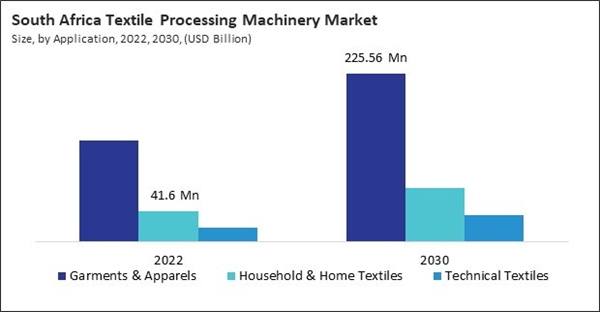The Brazil market dominated the LAMEA Textile Processing Machinery Market by Country in 2022, and would continue to be a dominant market till 2030; thereby, achieving a market value of $712 million by 2030. The Argentina market is showcasing a CAGR of 7.2% during (2023 - 2030). Additionally, The UAE market would register a CAGR of 5.2% during (2023 - 2030).
Dyeing machines and printing equipment apply color and designs to fabrics, enhancing their aesthetic appeal and marketability. Dyeing machines immerse fabrics in dye baths or apply dyes using techniques such as jet dyeing, beam dyeing, or garment dyeing. Printing equipment applies designs onto fabrics using screen printing, rotary printing, or digital printing. Also, finishing machinery such as calendars, centers, and compactors are used to improve the surface texture, appearance, and performance of fabrics through heat setting, coating, and embossing processes. These machines apply finishes such as water repellents, flame retardants, or wrinkle resistance treatments to enhance fabric properties and meet customer specifications.
Several trends are shaping the landscape of textile processing machinery, driving innovation, market expansion, and technological advancements. These trends reflect changing consumer preferences, industry demands, and emerging technologies. For example, automation and digitization transform textile processing operations, increasing efficiency, precision, and productivity. Machinery manufacturers integrate automation technologies such as robotics, artificial intelligence, and IoT (Internet of Things) to streamline production processes and enhance quality control.
e-commerce platforms facilitate market expansion and growth for textile processing machinery manufacturers in Brazil. As per the ITA, with the fastest-growing e-commerce growth rate in Latin America, Brazil is expected to surpass $200 billion in e-commerce by 2026, with a projected value of 14.3%. E-commerce platforms offer efficient sales channels for textile processing machinery manufacturers, streamlining the purchasing process for customers. Buyers in Brazil can browse a wide range of machinery options, compare features and prices, and make purchases conveniently online. This efficiency in sales channels reduces the time and effort required for manufacturers and customers, leading to increased sales and revenue opportunities. Thus, the growth of the region’s e-commerce sector is propelling the market’s growth.
Based on Application, the market is segmented into Garments & Apparels, Household & Home Textiles, and Technical Textiles. Based on Raw Material, the market is segmented into Cotton, Silk, Polyester, Wool, and Other. Based on Process, the market is segmented into Drying Machines, Ironing Machines & Presses, Washing Machine, Bleaching & Dyeing Machines, and Others. Based on countries, the market is segmented into Brazil, Argentina, UAE, Saudi Arabia, South Africa, Nigeria, and Rest of LAMEA.
List of Key Companies Profiled
- A.T.E. Private Limited
- Trützschler Group SE
- VANDEWIELE NV
- Rieter Holding Ltd.
- Lakshmi Machine Works Limited
- Murata Machinery, Ltd.
- LONATI SPA
- Tessenderlo Group nv
- Mayer & Cie. GmbH & Co. KG
- Toyota Industries Corporation
Market Report Segmentation
By Application- Garments & Apparels
- Household & Home Textiles
- Technical Textiles
- Cotton
- Silk
- Polyester
- Wool
- Other
- Drying Machines
- Ironing Machines & Presses
- Washing Machine
- Bleaching & Dyeing Machines
- Others
- Brazil
- Argentina
- UAE
- Saudi Arabia
- South Africa
- Nigeria
- Rest of LAMEA
Table of Contents
Companies Mentioned
- A.T.E. Private Limited
- Trützschler Group SE
- VANDEWIELE NV
- Rieter Holding Ltd.
- Lakshmi Machine Works Limited
- Murata Machinery, Ltd.
- LONATI SPA
- Tessenderlo Group nv
- Mayer & Cie. GmbH & Co. KG
- Toyota Industries Corporation









